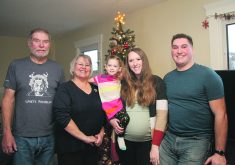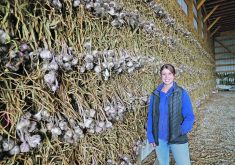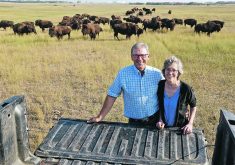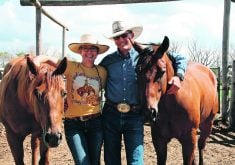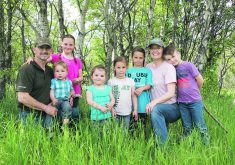DENZIL, Sask. — The Witzaneys love to grow food for local customers.
That’s the niche market they have moved into after starting New Life Organic Foods to market their homegrown produce, which includes beef, sheep, pork, poultry, eggs and milled grains.
“We really found that connection to growing food for families when we actually started feeding families. For me, and maybe because I was a city gal, I never made that connection that we were growing food. It was always just get a crop in the ground and get it harvested and then pay the bills and hopefully have something left over to live off of. It was just a commodity,” said Valerie Witzaney, who grew up in Estevan, Sask.
Read Also

Know what costs are involved in keeping crops in the bin
When you’re looking at full bins and rising calf prices, the human reflex is to hold on and hope for more. That’s not a plan. It’s a bet. Storage has a price tag.
Since 1999, New Life Organic Foods has primarily sold its meat and milled grain produce at the Saskatoon Farmer’s Market, and off the farm from their 320-acre operation, 14 kilometres north of Denzil.
Soon after marrying in 1989, Dave and Valerie Witzaney moved back to the homesteaded family farm to help Dave’s father, who they slowly bought out.
At the same time, the young couple were keen to grow their own family.
“When we got married, we always wanted to have a big family. At that time it was like, let’s have six or seven kids. And I think after we had our fourth, we were like, wow, this is so great, let’s just keep going with whatever happens,” said Valerie.
The Witzaneys now have 11 children, ranging from aged 30 to nine. Half of them have left home and are married with children of their own.
“There’s definitely a huge richness with a large family. The blessings of children are pretty amazing,” said Valerie.
Dave has always maintained an off-farm oilfield job in west-central Saskatchewan and for the first decade of marriage they continued to farm conventional crops.
However, with the quickly growing family and to make ends meet, they decided to go organic.
“We went to organics because it wasn’t penciling out conventionally. Initially it was the economics,” said Dave.
“We pretty much would sell the canola and pay all our bills with that and had nothing left.”
Surrounded by a sea of conventional grain farmers and being the only certified organic producers in the area, they admittedly had many questions and some hard lessons to overcome.
“Lots of green manure plow-downs to try to build that soil and build nitrogen because you weren’t relying on fertilizer anymore. So that was a learning curve,” said Valerie.
More than anything else, however, they said their improving soil spoke volumes and encouraged them to carry on.
Within the first four years, Dave said the soil was visibly improving.
“I remember when Dad farmed, we pulled out clumps when we tilled and now we weren’t. It was falling apart. It was mellow, spongy and had an earthy smell. It was beautiful,” he said.
He said Mother Nature has a way of teaching those who are open to learning.
“When you get those flash, half-inch rains and you walk out in our field and you really don’t get overly muddy and the water’s gone, it’s like, OK, something’s working right here because you’re getting moisture down where it needs to go,” he said.
“We have found that through working with nature and the ecosystem that is already present on our farm, we are able to farm more effectively and efficiently.”
A pleasant surprise followed as new plants began to emerge and grow from the re-conditioned soil, which an organic inspector told them were banked seeds that had been lying dormant for hundreds of years.
“When things balance themselves and you allow them to grow, you start to see what the soil needs. Those vetches come, they fix nitrogen, they feed the soil and they’re just lying there dormant. It was just amazing to see new plants come that we never planted,” he said.
And as the soil improved, it also nourished Dave’s enthusiasm to learn more.
“When I studied soil for the last three, four years — soil biology and trying to understand more of it — it keeps me going,” he said.
The couple have also incorporated a holistic management approach, particularly with the limited land base to grass-finish their cattle.
“I’m trying to run more cows with a small amount of land doing intensive grazing and holistic management. This year, I really saw my pastures’ plant growth explode. We did daily moves and then we’d bring (the cattle) back, give it a 60 to 90 day rest period and new growth was just phenomenal this year,” he said.
It’s a self-fulfilling cycle, he said. More micronutrients in the soil mean healthier food and feed for the cattle, which produces higher quality and nutrient dense meat.
“Learning to work with nature, instead of trying to master it, keeps us on our toes,” he said.
Added Valerie: “Even more than going organic, doing the holistic management, the intensive grazing, the soil management, actually (seeing) the results there, (we were) really connecting with the land ourselves and helping other people hopefully to connect with the land through the food that we grow for them.
“So that’s a whole new kind of cultural thing that’s happened to us that we weren’t expecting and now we have this real passion to grow food for families.”





